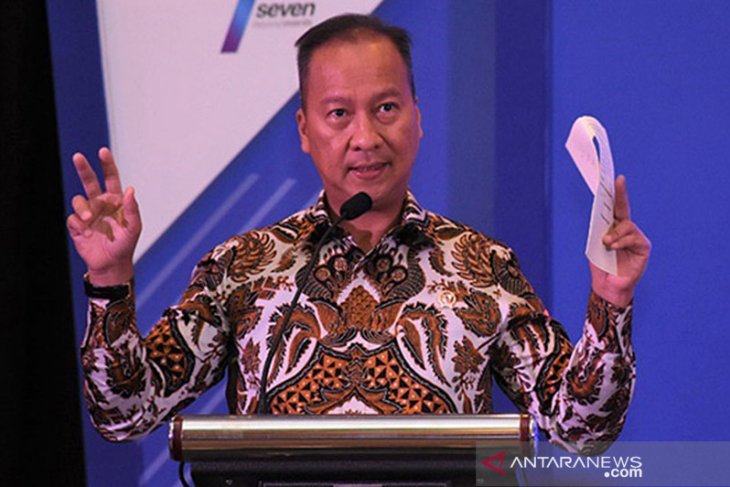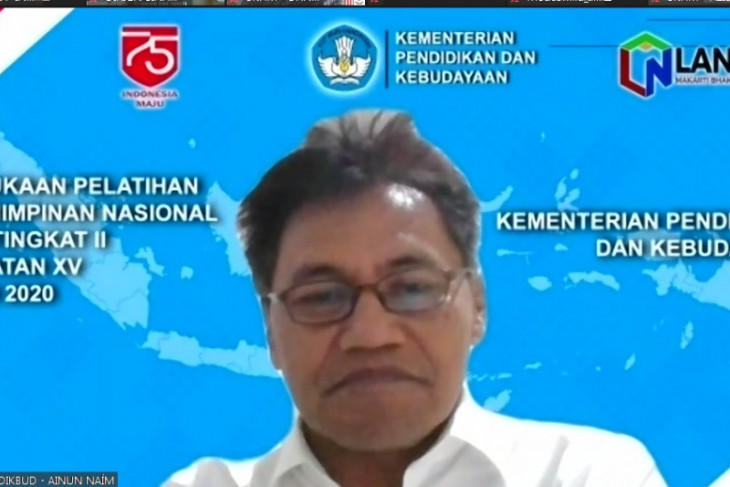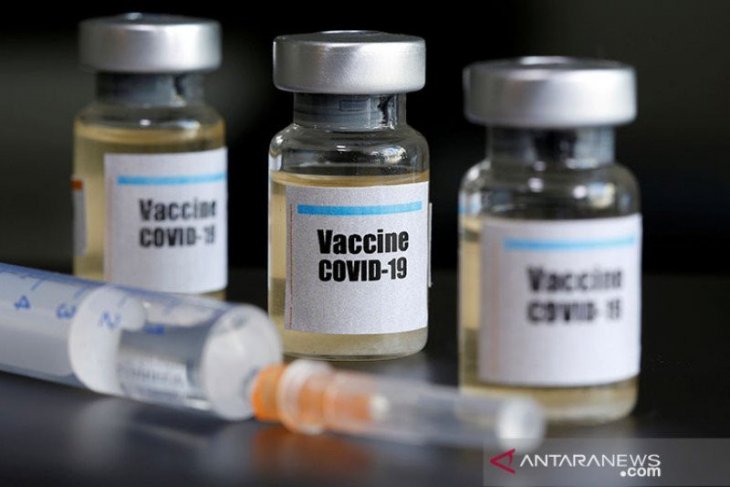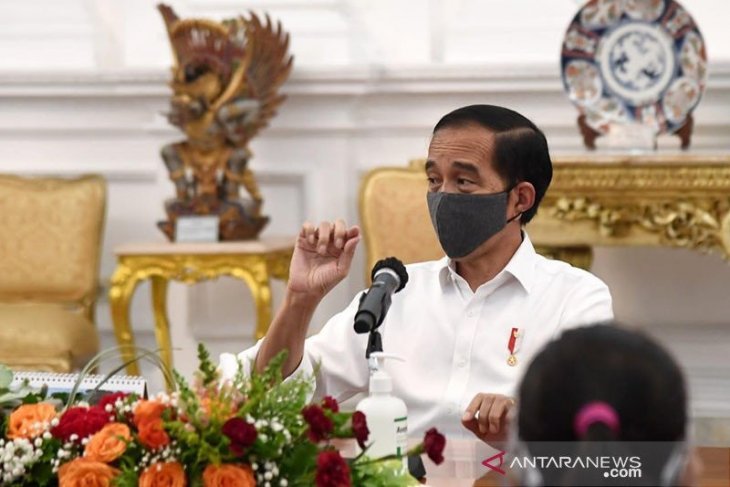Live Streaming
Program Highlight
Company Profile

Ani Hasanah
July

Industry Minister Agus Gumiwang Kartasasmita. ANTARA/HO-Industry Ministry/am/s)
Investment in the manufacturing sector in the first semester of 2020 rose 23.9 percent to reach Rp129.6 trillion, from Rp104.6 trillion recorded during the corresponding period in 2019.
"The government has committed to creating a conducive business climate though strategic policies to attract foreign and domestic investors to Indonesia," Industry Minister Agus Gumiwang Kartasasmita remarked during a webinar on the Mid-Year Economic Outlook 2020 in Jakarta on Tuesday.
Data of the Investment Coordinating Board (BKPM) indicated that the industrial sector had made a substantial contribution of 32.2 percent to foreign exchange income during the period from January to June 2020 of the total investment of Rp402.6 trillion.
The five largest contributors during the period are the basic metal industry, metal and non-machinery goods, with Rp45.2 trillion; food industry, Rp26.6 trillion; chemical and pharmaceutical industry, Rp19.5 trillion; non-metal mineral industry, Rp6.1 trillion; and automotive and transportation tool industry, Rp6 trillion.
Capital realization in the industries showed that Indonesia has become the main destination as a production base to meet the domestic and export market demand.
Kartasasmita reiterated that the ministry had worked proactively to attract investors in the industry sectors holding potential, including those seeking to relocate their factories. Among the potential sectors are the labor-intensive industry, import substitution industry, and industry that applies advanced technology.
"We encourage investment to produce import substitution goods and boost the use of locally made raw material and semi-finished goods," the minister stated.
The minister pointed out that the COVID-19 pandemic had brought about a nationwide realization to understand the structure of the domestic manufacturing industry.
"We can see that we still require some raw material or capital goods from other countries, both in the upstream and intermediate sector. Any shock that hits those countries will also affect us," he cautioned.
Hence, it is crucial to build a strong integrated supply chain to boost competitiveness of the country's manufacturing industry.
"We have facilitated the development of an integrated industrial zone that would open up the opportunity for Indonesia to attract global investors," the minister stated.
During the past five years, the number of industrial zones nationwide rose by 40 percent, or some 16.2 thousand hectares.
Currently, Indonesia has 112 industrial zones, spanning a total area of 52 thousand hectares.
"A total of 27 industrial zones will be built by 2024 in some regions across the country in Sumatra, Java, Kalimantan, Sulawesi, Maluku, Nusa Tenggara, and Papua," he noted.
Meanwhile, the Indonesian Industrial Estate Association (HKI) stated that as of June 2020, some 50 companies had invested in 17 industrial zones and occupied a total area of 139.31 hectares.
HKI Chairman Sanny Iskandar, concurrently deputy chairman of the Chamber of Commerce and Industry (Kadin) for Economic Zone, remarked that most of them were foreign investors.
"Of the total 50 investors that entered the industrial zone as of June 2020, some 29 are foreign investors, while 21 are domestic investors," he confirmed.
The 29 foreign investors occupied a total area of 99.44 hectares in the industrial zones, while the 21 domestic investors occupied an area totaling 44.87 hectares.
Iskandar remarked that the 29 foreign investors included 10 investors from South Korea, seven from Japan, three from China, and one from the US. (ANTARA)
July

Secretary general of Education and Culture Ministry, Ainun Naim. (ANTARA/Indriani/sh)
The Ministry of Education and Culture is evaluating the possibility of resuming face-to-face learning in schools outside the COVID-19 green zones.
"Indeed, we put in priority the safety and health (of students and teachers), but at the same time, we have to maintain the learning process. We are evaluating on how schools in zones other than green zones can conduct face-to-face learning with minimum risk," the ministry's secretary general, Ainun Naim, said in Jakarta on Tuesday.
Under the joint ministerial decree on guidance for learning process during the COVID-19 pandemic, only schools in green zones have been allowed to gradually resume offline schooling.
In the first stage of school reopening, only senior and junior high schools students would have face-to-face classes. They would be followed by students of elementary schools and extraordinary schools (SLB) after two months, and early childhood education (PAUD) after another two months.
The ministry's director general for Early Childhood Education, Elementary and High School, Jumeri, said the joint decree has laid down steps for reopening schools, including those in non-green zones. "We are still intensively discussing the matter,” Jumeri added.
The ministry has lauded 418 district and city administrations for adhering to the joint ministerial decree on the learning process.
The ministry said 79 districts/cities have violated the decree. Of the 79 regions, there are 18 green zones, 39 yellow zones, 20 orange zones, and 2 red zones. (ANTARA)
July

A small bottle labeled "COVID-19 vaccine" and a medical syringe, seen in the illustration taken on 10/4/2020. BETWEEN / REUTERS / Dado Ruvic / pri.
Deputy State-Owned Enterprises Minister Kartika Wirjoatmodjo confirmed that PT Bio Farma (Persero), on July 20, received the COVID-19 vaccine from Sinovac, China, and commenced testing for the phase-three clinical trial.
"With Sinovac from China, we have received a vaccine for a clinical trial that was commenced, and we expect to receive the results by the end of 2020," he remarked during the Indef Mid-Year Study held online in Jakarta on Tuesday.
The vaccine was received by the Bio Farma Bandung Team and its clinical trial will begin immediately under the direct leadership of Prof. Dr. Kusnadi from Padjadjaran University (Unpad). December 2020 is targeted for the fastest completion of the clinical trial.
Wirjoatmodjo expounded that the government, through state-owned enterprises, is actively conducting international cooperation in pursuit of the COVID-19 vaccine. In addition to Sinovac, Bio Farma is collaborating with the World Health Organization (WHO) and Coalition for Epidemic Preparedness Innovations (CEPI).
"Several other vaccine manufacturers are also being approached to simultaneously gauge the potential for vaccine discovery from various parts of the world," Wirjoatmodjo stated.
President Director of Bio Farma Honesti Basyir had earlier noted that the phase-3 clinical trial of the COVID-19 vaccine was scheduled to run for six months from August 2020, so it was targeted for completion in January 2021.
If the phase-3 clinical trial of the COVID-19 vaccine were to run smoothly, Bio Farma would produce it in the first quarter of 2021. The SOE has readied its production facilities, with a maximum capacity to produce 250 million doses.
Development of the COVID-19 vaccine is one of the five target programs of Bio Farma in dealing with the spread of the COV2 SARS virus that causes COVID-19. The others are the production of Real Time Polymerase Chain Reaction (RT-PCR), Convalescent Plasma Therapy, BSL 3 Mobile Laboratory BSL 3, and Viral Transport Media (VTM) Manufacturing. (ANTARA)
Deputy State-Owned Enterprises Minister Kartika Wirjoatmodjo confirmed that PT Bio Farma (Persero), on July 20, received the COVID-19 vaccine from Sinovac, China, and commenced testing for the phase-three clinical trial.
"With Sinovac from China, we have received a vaccine for a clinical trial that was commenced, and we expect to receive the results by the end of 2020," he remarked during the Indef Mid-Year Study held online in Jakarta on Tuesday.
The vaccine was received by the Bio Farma Bandung Team and its clinical trial will begin immediately under the direct leadership of Prof. Dr. Kusnadi from Padjadjaran University (Unpad). December 2020 is targeted for the fastest completion of the clinical trial.
Wirjoatmodjo expounded that the government, through state-owned enterprises, is actively conducting international cooperation in pursuit of the COVID-19 vaccine. In addition to Sinovac, Bio Farma is collaborating with the World Health Organization (WHO) and Coalition for Epidemic Preparedness Innovations (CEPI).
"Several other vaccine manufacturers are also being approached to simultaneously gauge the potential for vaccine discovery from various parts of the world," Wirjoatmodjo stated.
President Director of Bio Farma Honesti Basyir had earlier noted that the phase-3 clinical trial of the COVID-19 vaccine was scheduled to run for six months from August 2020, so it was targeted for completion in January 2021.
If the phase-3 clinical trial of the COVID-19 vaccine were to run smoothly, Bio Farma would produce it in the first quarter of 2021. The SOE has readied its production facilities, with a maximum capacity to produce 250 million doses.
Development of the COVID-19 vaccine is one of the five target programs of Bio Farma in dealing with the spread of the COV2 SARS virus that causes COVID-19. The others are the production of Real Time Polymerase Chain Reaction (RT-PCR), Convalescent Plasma Therapy, BSL 3 Mobile Laboratory BSL 3, and Viral Transport Media (VTM) Manufacturing.
July
 President Joko Widodo. Antara/the ministry of state secretariat)
President Joko Widodo. Antara/the ministry of state secretariat)
President Joko Widodo (Jokowi) urged his cabinet members to not forget the big strategic agendas amid the ongoing endeavors to deal with the COVID-19 pandemic.
"I want to emphasize again that although we face a difficult situation, we must not forget the big agendas, the great strategic agendas of our nation," President Jokowi remarked during a limited meeting on the Draft of the State Budget of 2021 held through videoconferencing from the Bogor Presidential Palace, West Java, Monday.
President Jokowi lay emphasis on the need to always bear in mind the strategic agenda, particularly concerning Indonesia's steps to escape the middle income trap.
"We all know that Indonesia has entered the middle-income country bracket. However, we are sentient of the fact that the challenge to escape the middle income trap still looms large and long," President Jokowi remarked.
At a recent virtual Indonesian Rector Forum Conference (FRI) from the Bogor Presidential Palace, President Jokowi pointed out that Indonesia had a huge opportunity to become a high-income nation based on several conditions, with one being the existence of superior, productive, innovative, and competitive human resources.
The Coordinating Ministry for Economy had earlier noted that at least 88 of the 223 strategic projects could have been completed during the period from 2016 to 2019, in which the projects were valued at Rp421.1 trillion, or 10.06 percent of the funds totaling Rp4,183 trillion.
The government is eyeing to complete 144 of the 223 projects worth Rp815.2 trillion, he stated, adding that the government's strategic agenda would not merely be related to the economic sector but also to the education and health ones.
In the health sector, the government has been endeavoring to lower the number of cases of children with stunted growth and fight TB, malaria, dengue fever, and HIV/AIDS, he remarked.
Coronavirus infections initially emerged in the Chinese city of Wuhan at the end of 2019.
Since then, COVID-19 has spread to over 202 countries and territories, including Indonesia, with a massive spurt in death toll.
The Indonesian government officially confirmed the country's first cases on March 2 this year.
To contain the spread of the coronavirus disease, the Indonesian authorities have enforced large-scale social restrictions and distancing measures in several cities, including Jakarta, Bogor, Bekasi, Surabaya, and Makassar.
The Indonesian government has also begun enforcing a new normal amid the COVID-19 pandemic in four provinces and 25 cities and districts. (ANTARA)

